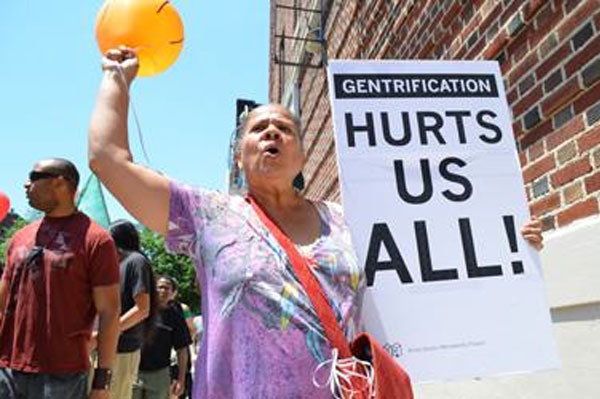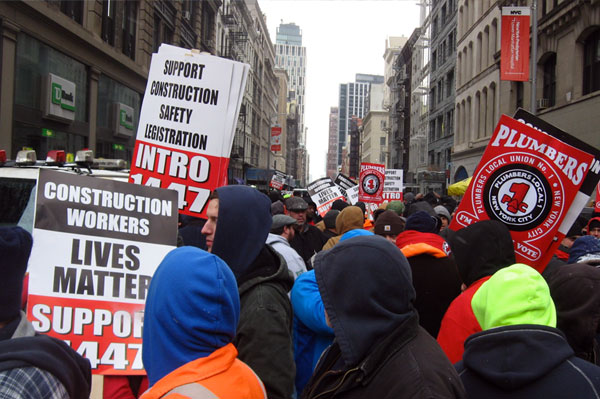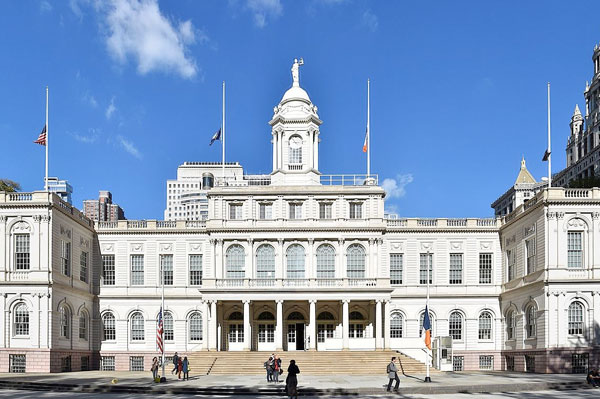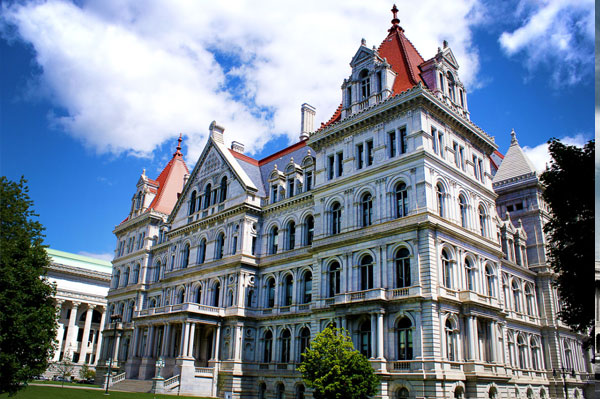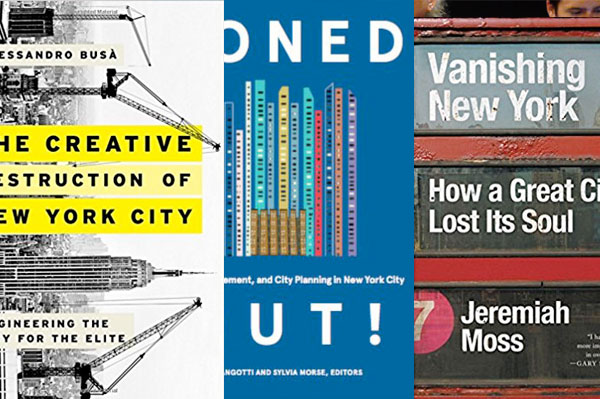The Loss of Mom-and-Pop Stores That Can't Compete With Amazon
The New York Times Opinion | Dec. 7, 2019 | Read Original
Readers discuss how giant online stores like Amazon and rising rents have forced small entrepreneurs out of business.
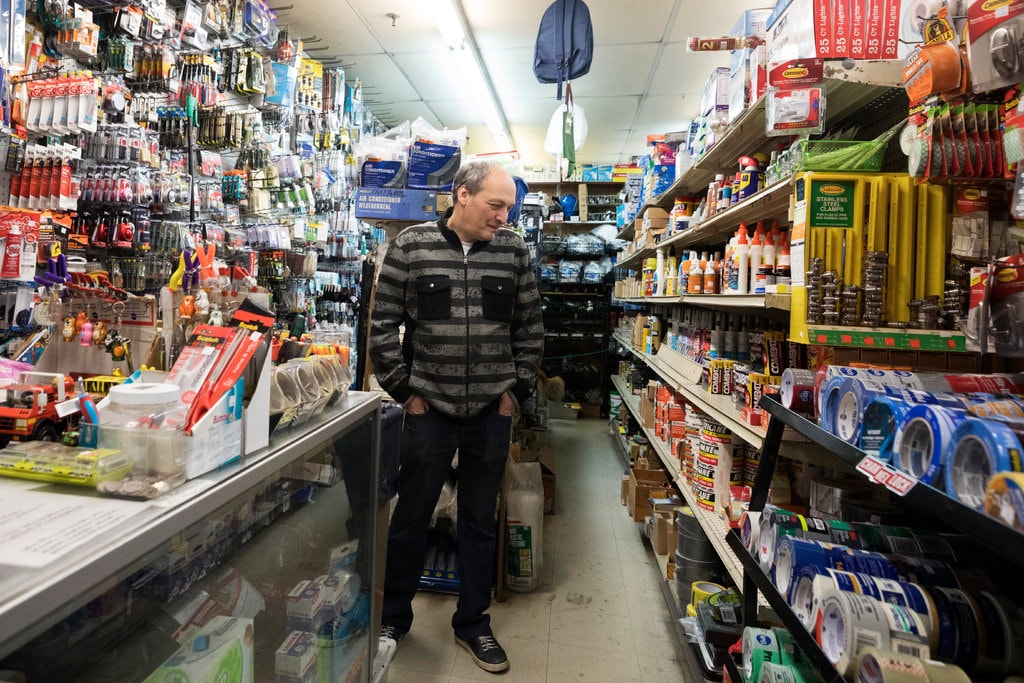
Naum Feygin in Chelsea Convenience Hardware, which he has owned since 1997.James Estrin/The New York Times
To the Editor:
Re "Better, Cheaper and Faster Than Amazon" (Sunday Review, Nov. 24), in which Tim Wu laments the imminent closing of his neighborhood hardware store:
In 1987 my family and I moved into an older rental duplex near the center of Ridgewood, N.J. And, of course, there were many small "fixes" that needed to be done that involved hardware such as steam valves for the radiators, rubber washers for leaky faucets, etc.
Fortunately, Village Hardware was only a short walk away. The two-story store had myriad items stored on shelves or in bins and drawers. The owner, Cliff, was a walking encyclopedia of home repairs. All you needed to do was to describe your problem and he would know exactly what you needed and how to fix the problem.
Sadly, Home Depot had recently opened a town away, and it eventually forced the store to close. Every time I found myself traipsing up and down the endless aisles of Home Depot in search of a small item, I found myself wishing that a local hometown store like Village Hardware were still in business. Stores like that are a local treasure that are becoming harder and harder to find.
Paul Williams
Cornwall, N.Y.
To the Editor:
Tim Wu tells yet another sad story about the demise of New York City's mom-and-pop stores, even though local stores can be cheaper and more efficient than ordering from Amazon. Rent gouging during lease renewal is a major reason so many small businesses are in crisis and closing in record numbers, resulting in the annual loss of tens of thousands of jobs. Small entrepreneurs are at the mercy of money-grubbing landlords and property speculators.
A fundamental change in American capitalism is not why thousands of New York City small businesses are shutting down. They are disappearing because the Real Estate Board of New York, for 33 years, has stymied passage of the Small Business Jobs Survival Act, which would provide small businesses rights to negotiate fair lease terms and an arbitration process to end rent gouging. Such legislation will lead to billions of dollars staying in the pockets of small businesses, their employees and the local economy.
Ray Rogers
New York
The writer is co-founder and director of Corporate Campaign, which works on behalf of labor unions and the public interest.
To the Editor:
This is an all too familiar tale to us, the former owner of Radio Clinic, a now defunct appliance store on the Upper West Side, and the daughter who wrote a book that chronicled the store's 80-year history. As the rents started rising in the 1980s, continued to rise through the 1990s and escalated through the 2000s, the small family-owned businesses that have played a vital role in the fabric of communities have continued to close. We know exactly how it tears a neighborhood's fabric every time another longstanding business goes under.
Yet for decades the city never took action to protect small shop owners from runaway rents. Here we still are, with stores like Chelsea Convenience closing. The question is whether and when will the city take action on storefront rents before it's too late.
Alan Rubin
Jen Rubin
New York
To the Editor:
Tim Wu's article on the demise of the local hardware store certainly speaks to my heart. Our local hardware store, Young Hardware in Staunton, Va., closed its doors several months ago. I have been mourning it like the death of a family member ever since. For three decades since I moved to town, Young's was my trusted and reliable neighbor, holding my life together with every nut and bolt.
The good news, I guess, was that it was Mr. Young's retirement, rather than the forces of big business, that led to its closure. I still don't know whether to congratulate him for retiring, or hate him for taking away a piece of my life.
E. Perry Neel
Staunton, Va.
To the Editor:
As a boomer, I mourn the loss of the local hardware store's parent, where almost nothing was prepackaged. Back in the 1960s, even casual D.I.Y.-ers bought nails by the pound, which they scooped up from thousands displayed openly in barrels — yes, real barrels.
Linda Morgan
San Francisco
To the Editor:
Re "Retailers Strike Back Against Amazon, but Can They Weather Counterpunches?" (front page, Nov. 26):
I shop both ways: Amazon when I need something I'm not sure where else to find it, local when I know exactly what I want and where to find it, or I want to look at options or try on clothing. Sometimes I buy books on Kindle when traveling. I also buy books in bookstores, because bookstores and books have made a huge impact in my life, not only the ideas in books, but the process of discovery in touching and skimming real books in a store. My brain lights up in a way not possible when ordering books on Amazon.
I actively shop local because I don't want department stores or bookstores or retail to die simply because Amazon can afford, and is allowed to pursue, aggressive predatory pricing and "free" shipping (paid by my $120 annual Prime fee). I have knowingly paid more at Walgreens for toiletries.
My point? While I cannot boycott Amazon, I will not give in to, or over to, it. It is becoming a monopoly, and we as a culture are so bedazzled by billionaires that our legislators seem incapable of creating regulations to curb aspiring monopolies' worst practices.
I do not have answers.
Sigh ...
Suzanne Brisendine
San Francisco
To the Editor:
Interestingly, I did not see any reference to the reason our independent bookstore sees thousands of customers every year: the personal relationships, the unique nature of our store and the integrated relationship with our community.
Our downtown book shop, with its compassionate and activist staff, acts as a safe space for the many locals and travelers who need to deliver a good rant about the stresses of life under the Trump regime or a place to nurse a baby, or those who have health problems and know they will find a sympathetic ear.
While Amazon is always a presence in retail at this time, we do not compete with Amazon. What we offer is something we will never cede to an algorithm — commitment to making the world a more just and compassionate place.
Nancy Braus
Brattleboro, Vt.
The writer is the owner/manager of Everyone's Books.
To the Editor:
This is a classic doubled-edged sword situation. Brick-and-mortars cannot compete with the vast variety, price point and convenience of Amazon, yet for certain purchases an in-store experience is preferred. Some things need to be touched and seen for the full experience — think towels and large appliances.
So what is the answer? Perhaps a brick-and-mortar tied to a larger curator/supplier like Amazon in some sort of networking deal? Only time will tell. Best that we all make a concerted effort to support the little guys. It matters.
Patricia McMillan
Camp Hill, Pa.
To the Editor:
Re "The Amazon Behemoth and Its Would-Be David" (Business, Nov. 26), about a coalition that is encouraging resistance to Amazon:
I am suspicious of any organization whose seed funding comes partly from George Soros. First of all, Amazon was not "forced to begin paying a $15 hourly minimum wage nationwide." It chose to do so. And the political forces that managed to keep the company from building a warehouse in Queens did no favor for the residents of that area.
Enormous success, such as that achieved by Amazon, will always create a backlash from the disgruntled groups who trade in, well, disgruntlement. If only all our companies could be run as well as Amazon, we would have nothing to fear from our economic adversaries. No, I have no personal interest in Amazon other than to be continually impressed by its unfailing efficiency and superb customer service.
Joseph Gagen
Albany, N.Y.
To the Editor:
Here's how I use Amazon while supporting vendors' own supply-chain and shipper: I shop first on Amazon to find the manufacturer and a sample (low) price. Then I go to the manufacturer's website and see if I can either buy the product directly, or find an alternative supplier or even a local store. If the total price is within 15 percent or so of Amazon's, I'll opt to buy that way instead.
I did this recently for a thermal camera costing about $200, and the manufacturer charged no more than Amazon, shipped quickly and free, and even threw in a mobile charging pack. And its packaging was minimal, unlike Amazon's.
Dean Gallea
Tarrytown, N.Y.




